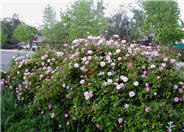
Common name:Cecile Brunner Rose (polyantha)
Botanical name:Rosa 'Cecile Brunner'
This climbing rose can grow as tall as 25 feet with support. It has become one of the most popular roses in cultivation because of its strong display in spring of lightly fragrant flowers that look like tiny, high centered hybrid tea roses. It is long-lived, disease resistant and tolerates everything from poor soil to partial shade.
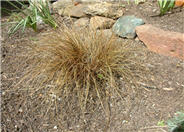
Common name:Leather Leaf Sedge
Botanical name:Carex buchananii
This orange/bronze ornamental grass/reed is 2-3'H x 1-2' W and does best in full sun to part shade.
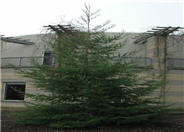
Common name:Coast Redwood
Botanical name:Sequoia sempervirens
This fast-growing, aromatic tree has soft, dark green foliage with long needles appearing in flat sprays and brown, barrel-shaped cones that appear after 1 year. Its soft, red-brown bark is fiberous and furrowed. Particularly after mechanical damage, this tree will stump sprout to form new, young trees around the stump. Avoid planting in areas of high foot traffic.

Common name:Jupiter's Beard, Red Valerian
Botanical name:Centranthus ruber
This perennial groundcover will grow 1-3' high and has medium-size blue/green leaves with red, pink, or white flowers that bloom in the summer. Very weedy near coast.
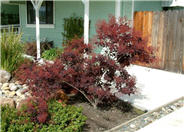
Common name:Purple Smoke Tree
Botanical name:Cotinus coggygria 'Purpureus'
A deciduous shrub or small tree that grows up to 10' tall, the purpureus is grown for its wispy, thread-like flower clusters and outstanding fall color. Its foliage has a redish purple color that turns somewhat green in summer. The plant requires sun to part shade, with little or no summer water. -Monterey Bay Nursery
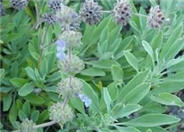
Common name:Sonoma Sage, Creeping Sage
Botanical name:Salvia sonomensis
This low growing, native groundcover has glaucous green leaves with blue-violet flowers that bloom in the spring and summer.
| Designer: 2660 E Lake Ave., Watsonville | Party Ready Garden |
Photographer: GardenSoft |
Soils and Compost:
Physical weed control, including mulching, or hand removal protects the watershed from harmful chemicals.
Water Saving Tip:
Check soil moisture below the surface with a soil probe or large screwdriver, trowel or shovel. Don't assume the plants need water just because the soil surface looks dry.
Integrated Pest Management:
Attract, or buy beneficial insects such as ladybugs and lacewings to control pest outbreaks in your garden.
